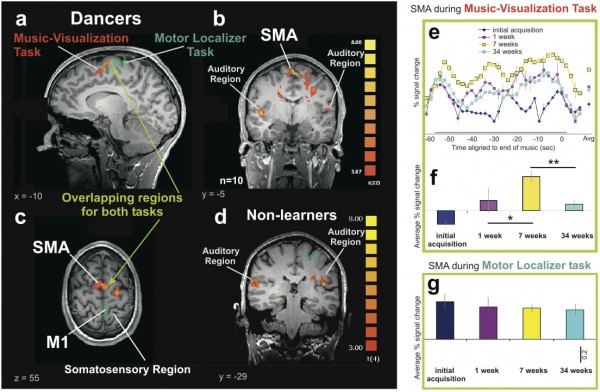Practice makes perfect, York U brain study confirms
TORONTO, January 29, 2015 — ‘Practice makes perfect’ may be a cliché but a new brain study out of York U affirms this age old theory.
In this study, Faculty of Health researchers were looking at fMRI brain scans of professional ballet dancers to measure the long-term effects of learning.
“We wanted to study how the brain gets activated with long-term rehearsal of complex dance motor sequences,” says Professor Joseph DeSouza, who studies and supports people with Parkinson’s disease. “The study outcome will help with understanding motor learning and developing effective treatments to rehabilitate the damaged or diseased brain.”
 For the study, 11 dancers (19-50 years of age) from the National Ballet of Canada were asked to visualize dance movements to music, while undergoing fMRI scanning. The scans measured Blood-Oxygen-Level-Dependent (BOLD) contrasts at four time points over 34 weeks, when they were learning a new dance.
For the study, 11 dancers (19-50 years of age) from the National Ballet of Canada were asked to visualize dance movements to music, while undergoing fMRI scanning. The scans measured Blood-Oxygen-Level-Dependent (BOLD) contrasts at four time points over 34 weeks, when they were learning a new dance.
“Our aim was to find out the long-term impact of the cortical changes that occur as one goes from learning a motor sequence to becoming an expert at it,” says coauthor Rachel Bar, who was a ballet dancer herself. "Our results also suggest that understanding the neural underpinnings of complex motor tasks such as learning a new dance can be an effective model to study motor learning in the real world.”
The results showed that initial learning and performance at seven weeks led to increase in activation in cortical regions during visualization of the dance being learned when compared to the first week. However, at 34 weeks, it showed reduced activation in comparison to week seven.
“We found that in the learning process, our brain function makes an inverted ‘U’ learning pattern from a slow pace at the start, accelerating to a peak at the midpoint, before returning to the original pace, once we have mastered the task,” says DeSouza. “An everyday example would be learning to drive a manual car, where you constantly have to think about shifting the gears until you master it and then do it instinctively.”
The study, “Tracking Plasticity: Effects of Long-Term Rehearsal in Expert Dancers Encoding Music to Movement” was published in PLOS ONE today.
NOTE: The study is available to media upon request
York University is known for championing new ways of thinking that drive teaching and research excellence. Our 52,000 students receive the education they need to create big ideas that make an impact on the world. Meaningful and sometimes unexpected careers result from cross-discipline programming, innovative course design and diverse experiential learning opportunities. York students and graduates push limits, achieve goals and find solutions to the world’s most pressing social challenges, empowered by a strong community that opens minds. York U is an internationally recognized research university – our 11 faculties and 24 research centres have partnerships with 200+ leading universities worldwide.
Media Contact:
Gloria Suhasini, York University, 416-736-2100, ext. 22094, suhasini@yorku.ca






